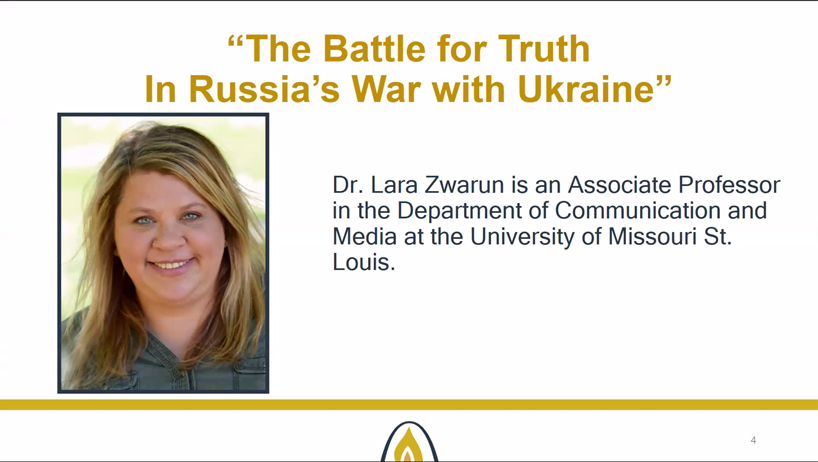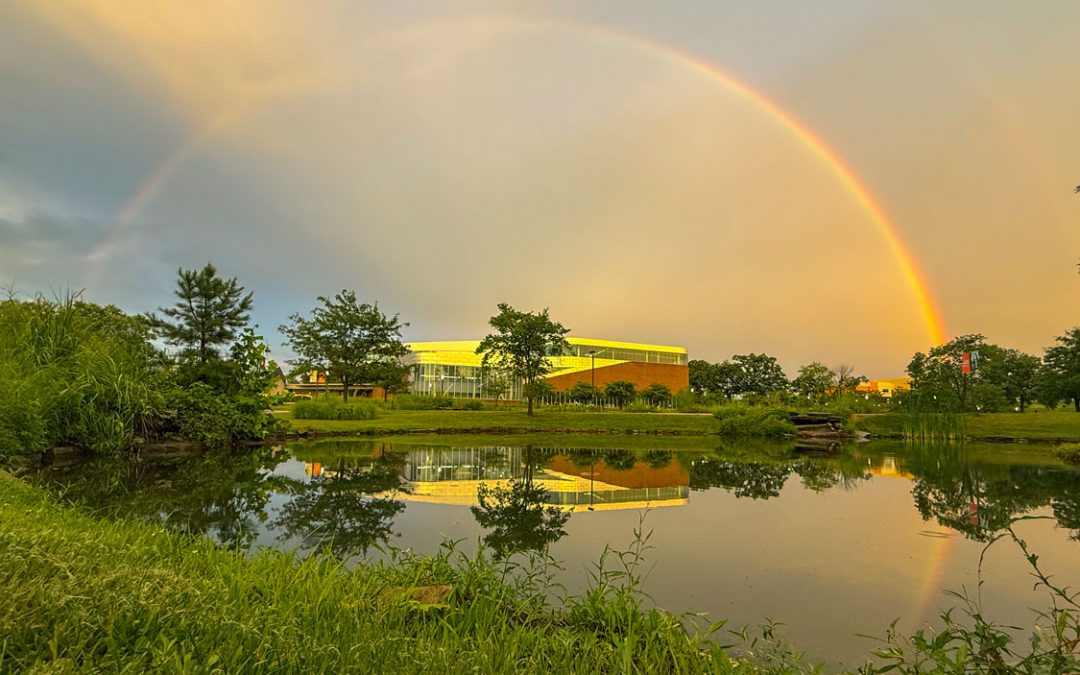
Lara Zwarun was the featured speaker in a webinar on “The Battle for Truth in Russia’s War with Ukraine,” hosted last Wednesday by the St. Louis Kaplan Feldman Holocaust Museum.
Russia’s invasion of Ukraine has felt personal to Lara Zwarun, an associate professor of communication and media at the University of Missouri–St. Louis and the daughter of a Ukrainian immigrant father, who came to the United States as a child in the early 1950s.
The news coverage over the past four weeks has also stirred up more recent memories Zwarun has of visiting Ukraine in the summer of 2015 after Russia’s annexation of Crimea the year before. A scholar of persuasion and media effects who teaches a course on dangerous messages, Zwarun went to examine the effects of social media on countering misinformation – a topic that remains relevant in the information war being fought from both sides as the Russian artillery fire continues to rain down on Ukrainian cities.
Zwarun has been called on to shared her perspective on the fighting and the ongoing battle for persuasion over the past several weeks, including in a March 7 interview with “St. Louis on the Air” host Sarah Fenske on St. Louis Public Radio and in a webinar last Wednesday hosted by the St. Louis Kaplan Feldman Holocaust Museum and titled “The Battle for Truth in Russia’s War with Ukraine.”
“What’s happening is happening on the streets, but it’s also happening via social media and communication among regular people,” Zwarun told Fenske on March 7.
She’s observed a sophisticated effort by Ukrainians to counter disinformation from Russia and also develop their own messages of persuasion. In one example, she cited the website 200rf.com, which was created by the Ukrainian Ministry of Internal Affairs to post photos and videos of Russian soldiers who’ve been captured in the fighting.
The intended target audience was Russian families, which explains why the Russian Federation responded by blocking the site in Russia.
“If they can access it, they can look online for clues to see if their loved one, their son, is one of the people,” Zwarun said on “St. Louis on the Air.” “It’s kind of grim, but I think it also makes a very powerful, undeniable message. The people in Russia who are most likely to realize that they’re being fleeced by their media are parents.”
The messaging war between Russia and Ukraine has been going on for decades, even in the Russification of Ukrainian names of cities – e.g. Kiev instead of the Ukrainian-preferred Kyiv – or even the name of the nation itself. Ukrainians prefer it be called Ukraine, though in the past it was often referred to as “The Ukraine,” implying it belonged to someone else.
Russia’s earlier incursion into Ukraine in 2014 did not generate as much or as sustained interest in the West as the events of the past four weeks, but there’s been fighting going on within Ukraine ever since with Russian-backed separatists battling the Ukrainian military in the Donbas region in Eastern Ukraine.
When Zwarun visited Ukraine in 2015, she surveyed ordinary citizens about those events.
“I just asked people, ‘How do you want this described with words?,’” Zwarun said. “‘How would you talk about this? Who is fighting this war? Is it a war?’ Half of the people called it a war or wanted it to be called war and another 35% wanted it to be called an invasion. Less than 10% of the people wanted to call it a conflict, which is what we typically have called it in the years leading up to what’s happening now. Conflict is a lot less lesser than a war and invasion. There were also a handful of people who offered other names, and they were all sort of in the same camp of, ‘Hey, let’s call what’s really going on by its real name. This is Russia invading Ukraine.’”
Zwarun, who was a UM System Presidential Engagement Fellow in 2019-2020, discussed ways Ukrainians have used social media in the information war, including connecting with the diaspora, for state diplomacy, to show what’s happening on the ground and, importantly, to counter disinformation.
The last one takes being savvy enough to check sources of information and recognize some things that are not true and keep them from spreading.
Social media can also be used a geopolitical tool to win over hearts and minds and share the strength of a particular culture as well as a way to put pressure on elected officials.
“We are what Ukraine is fighting for,” Zwarun said. “This is the setup that they are dying to have. It’s up to us to use it, and there’s absolutely evidence that this is mattering. A lot of the Congress, people are saying to Biden, we have been home in our home states and our home cities, and people are not happy. They want us to do more. They were pushing that message on to the federal government. So, knowing who your senators are, knowing who your representatives are, getting involved is very important. I probably don’t have to tell this audience because they’re here today.”
To watch Zwarun’s presentation, click on the video below:
Media Coverage
St. Louis Public Radio














